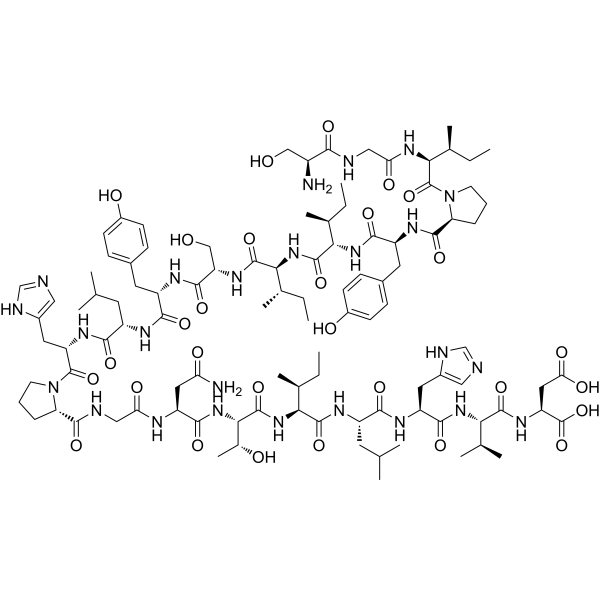
IRBP
CAS No. 211426-18-5
IRBP( Interphotoreceptor Retinoid Binding Protein Fragment IRBP )
Catalog No. M29819 CAS No. 211426-18-5
Interphotoreceptor Retinoid Binding Protein Fragment (IRBP) is a 20-residue peptide, which is a major pathogenic epitope. It exists in the first homologous repeat of interstitial visual pigment Binding Protein peptide (IRBP 161-180) and can induce post-uveitis (EAU).
Purity : >98% (HPLC)
 COA
COA
 Datasheet
Datasheet
 HNMR
HNMR
 HPLC
HPLC
 MSDS
MSDS
 Handing Instructions
Handing Instructions
| Size | Price / USD | Stock | Quantity |
| 100MG | Get Quote | Get Quote |


|
| 200MG | Get Quote | Get Quote |


|
| 500MG | Get Quote | Get Quote |


|
Biological Information
-
Product NameIRBP
-
NoteResearch use only, not for human use.
-
Brief DescriptionInterphotoreceptor Retinoid Binding Protein Fragment (IRBP) is a 20-residue peptide, which is a major pathogenic epitope. It exists in the first homologous repeat of interstitial visual pigment Binding Protein peptide (IRBP 161-180) and can induce post-uveitis (EAU).
-
DescriptionInterphotoreceptor Retinoid Binding Protein Fragment (IRBP) is a 20-residue peptide, which is a major pathogenic epitope. It exists in the first homologous repeat of interstitial visual pigment Binding Protein peptide (IRBP 161-180) and can induce post-uveitis (EAU).
-
In Vitro——
-
In Vivo——
-
SynonymsInterphotoreceptor Retinoid Binding Protein Fragment IRBP
-
PathwayOthers
-
TargetOther Targets
-
Recptor——
-
Research Area——
-
Indication——
Chemical Information
-
CAS Number211426-18-5
-
Formula Weight2209.5
-
Molecular FormulaC103H157N25O29
-
Purity>98% (HPLC)
-
Solubility——
-
SMILES——
-
Chemical NameSequence:{Ser}{Gly}{Ile}{Pro}{Tyr}{Ile}{Ile}{Ser}{Tyr}{Leu}{His}{Pro}{Gly}{Asn}{Thr}{Ile}{Leu}{His}{Val}{Asp}
Shipping & Storage Information
-
Storage(-20℃)
-
ShippingWith Ice Pack
-
Stability≥ 2 years
Reference
Tang J, et al. Autoimmune uveitis elicited with antigen-pulsed dendritic cells has a distinct clinical signatureand is driven by unique effector mechanisms: initial encounter with autoantigen defines diseasephenotype. J Immunol. 2007 May 1;178(9):5578-87.
molnova catalog



related products
-
Butyl 3-butoxypropan...
Butyl 3-butoxypropanoate is commonly used in flavors and fragrances.
-
Butyl isothiocyanate
Butyl isothiocyanate is an isothiocyanate having a butyl group attached to the?nitrogen. It has a role as a hapten.
-
Monotropein
Monotropein has anti-inflammatory action by inhibition of the expressions of inflammatory mediators via NF-κB inactivation, and support its possible therapeutic role in colitis.



 Cart
Cart
 sales@molnova.com
sales@molnova.com


